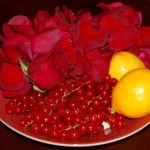Em-i-lis’ Love Letter Jelly
/Summary: This recipe is a love letter. My sweet husband always brings me a beautiful bunch of red roses on Valentine's Day. I love his dear predictability but also the tradition which, in addition to being ours, is also one that my parents have; married since 1973, Dad still sends Mom long-stem red roses, delivered to the door, each and every Valentine's Day.
In 2012, something happened to make the whole day even more special: my sister became engaged to a wonderful man. Just as my hubby walked in the door with roses for me, my sister called from Italy (she lives in Florence) to share her big news.
In honor of everyone involved in this sweet story, I used my roses to make this jam, and I sent my sister and her fiance a jar of their own.
It's magnificent atop lemon curd. As currants have a rather short season, you can sub raspberries if need be but use just 3 or 3½ ounces because raspberries have a more pronounced flavor.
I used Claudia Roden's Rose Petal Jelly recipe as the foundation for this and went from there, adding currants and Meyer lemon to the mix. This jam sets slowly so don't worry if it seems loose in the jar after the water bath. Mine took a full 24 hours.
**NOTE: When I refer to rosewater in this recipe, it is the water that results from boiling the petals, NOT store-bought rosewater.
**NOTE 2: If you like to add the pectin that naturally occurs in seeds, stems and such, save the lemon seeds and ends, currant stems and apple core, and tie them up in a piece of cheesecloth. You can add this little "purse" to the pot during the jelly-making process. It's optional.
Yield: 2½ pints
Ingredients:
- 3 ounces fresh red rose petals (do not use ones that have been sprayed with insecticide or the like); this is roughly 12 or 13 roses, headed
- 3 tablespoons freshly squeezed Meyer lemon (or regular lemon) juice, divided
- 6 cups water, or more
- 1 cup granulated sugar
- 1 cup reserved rosewater
- 1 Meyer lemon, washed and diced (including peel except for large ends)
- 1 small, firm apple (about 4 ounces), cored but left unpeeled, diced
- 1 box fresh red currants, 5.3 ounces
- 1½ cups granulated sugar (you might need a bit more, per your taste)
- ¼ cups granulated sugar, whisked with 2 teaspoons natural pectin
Instructions
Make the rosewater: Wash the rose petals well, and trim off any white ends you come across. Drain the petals and place into a 4-quart, or larger, pot. Cover with fresh, cold water, add 1½ tablespoons lemon juice, bring to a boil, and then simmer for 30 minutes, stirring occasionally.
When the water is red, and the petals have faded to a pale magenta, drain the petals, reserving 4 cups of the rosewater. Set the petals aside.
In the same pan, combine 2 cups reserved rosewater (from what you just drained and set aside), ½ cup water, 1 cup sugar and the remaining 1½ tablespoons Meyer lemon juice. Boil 10 minutes, making sure sugar is dissolved. Remove from heat and stir in reserved petals. Let macerate 2 hours and then drain, reserving this rose syrup. At this point, you can dispose of the petals.
At this point, if you're planning to can this jelly, get your canning pot set up- water boiling, jars out, etc.
In a (separate) large pot, add another 1 cup reserved rosewater, 1 cup water, the diced lemon, diced apple, and the cheesecloth purse (if using; see note 2 above). Turn the heat to high. When boiling, add the currants, and the rose syrup you made earlier. Boil 10 minutes, remove cheesecloth purse, and add 1½ cup sugar.
Let the mixture cook until the sugar dissolves and a nice boil returns. Remove from heat and carefully strain through a fine-mesh sieve, ultimately returning the liquid to your pot. Put all solids into a foodmill set with the finest disk, place the mill over the pot holding the liquid, and crank until all additional juice is pressed out. Discard solids.
Return this strained "jelly" to a boil, and whisk in about 1/4 of your sugar-pectin mixture. You might get a few small clots which you can strain out. At this point, you can do the freezer-plate test, or you can just go for it (the freezer-plate test is kind of hit or miss in my opinion). Ladle into jars and process in the boiling water bath for 10 minutes.











